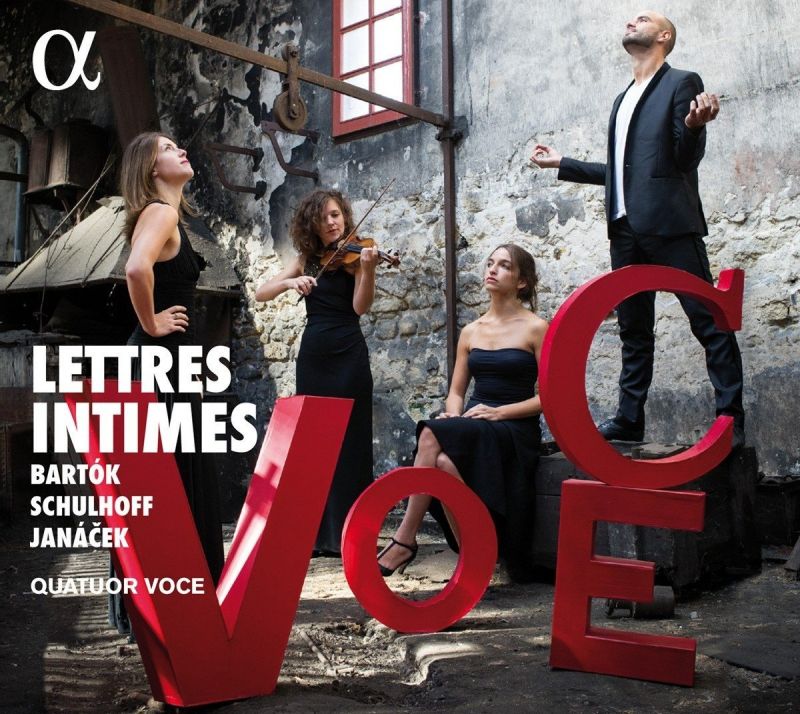Lettres intimes
View record and artist detailsRecord and Artist Details
Composer or Director: Leoš Janáček, Béla Bartók, Ervín Schulhoff
Genre:
Chamber
Label: Alpha
Magazine Review Date: 05/2017
Media Format: CD or Download
Media Runtime: 70
Mastering:
DDD
Catalogue Number: ALPHA268

Tracks:
| Composition | Artist Credit |
|---|---|
| String Quartet No. 1 |
Béla Bartók, Composer
Béla Bartók, Composer Voce Quartet |
| String Quartet No. 2, 'Intimate Letters' |
Leoš Janáček, Composer
Leoš Janáček, Composer Voce Quartet |
| (5) Pieces |
Ervín Schulhoff, Composer
Ervín Schulhoff, Composer Voce Quartet |
Author: Rob Cowan
The first thing to say about the Quatuor Voce’s playing is that it does indeed accentuate the music’s intimate side: Bartók’s Lento first movement is, at its opening, so hushed you dare not breathe, although, as the music rises in temperature (which it does soon enough), the players up the intensity level significantly. The Allegretto second movement has an engaging mobility about it, with salient themes thoughtfully brought into prominence within the context of the whole: no idea is allowed to hog the limelight unduly. Certainly the recording, which is superb in all respects and presents an extremely realistic sound frame, helps focus the effect. Maybe the Alma Quartet sound marginally more gemütlich in the Viennese-flavoured first piece from Schulhoff’s set of five, and their take in the Alla Serenata ups the tempo in comparison with Quatuor Voce, but both performances work well.
Janáček’s Second Quartet comes off best of all, with the composer’s eerie use of sul ponticello (even within the first minute) proving especially effective. Still, once Janáček sets off con moto and asks for a more natural mode of playing, Quatuor Voce are fastidious over observing markings such as fortissimo, mezzo-forte, espressivo and so on. The wonderful Moderato third movement, a cradling lament, is played with affecting simplicity and the finale’s furiously scrubbing onslaughts (at, say, 5'08") are high in shock value. Given the unusual programming context, comparisons are somewhat irrelevant; but, as a well-performed overview of that was happening quartet-wise during a specific 20 year stretch of the first half of the last century, you could hardly do better.
Discover the world's largest classical music catalogue with Presto Music.

Gramophone Digital Club
- Digital Edition
- Digital Archive
- Reviews Database
- Full website access
From £8.75 / month
Subscribe
Gramophone Full Club
- Print Edition
- Digital Edition
- Digital Archive
- Reviews Database
- Full website access
From £11.00 / month
Subscribe
If you are a library, university or other organisation that would be interested in an institutional subscription to Gramophone please click here for further information.




